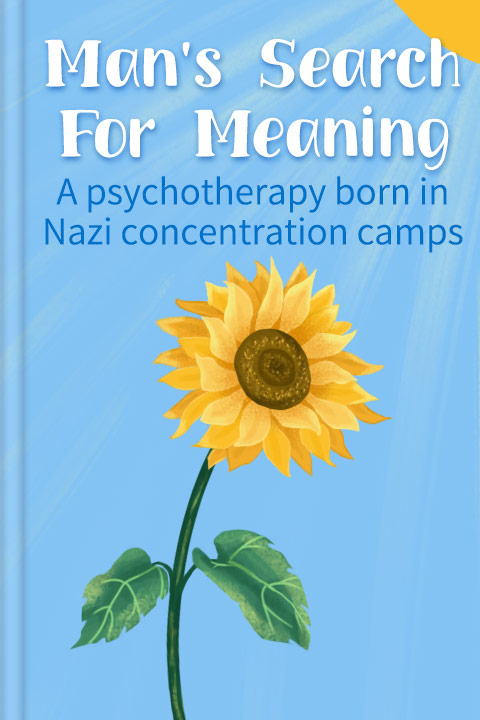Last updated on 2025/04/30
Man's Search For Meaning Summary
Viktor E. Frankl
Finding purpose amidst suffering and life's challenges.
Last updated on 2025/04/30
Man's Search For Meaning Summary
Viktor E. Frankl
Finding purpose amidst suffering and life's challenges.
Description

How many pages in Man's Search For Meaning?
192 pages
What is the release date for Man's Search For Meaning?
In "Man's Search for Meaning," Viktor E. Frankl, a Holocaust survivor and psychiatrist, embarks on a poignant journey through the harrowing experiences of life in Nazi concentration camps, revealing the profound discovery that even amidst unimaginable suffering, one can find purpose and meaning. This deeply moving memoir melds personal narrative with psychological insights, illustrating how the human spirit can endure and thrive despite overwhelming adversity. Frankl's compelling argument that the search for meaning is not only essential for survival but is also a fundamental aspect of being human, invites readers to reflect on their own lives and search for their unique purpose. As you turn the pages, be prepared to challenge your understanding of fulfillment and resilience, and perhaps uncover a new perspective on your own existence.
Author Viktor E. Frankl
Viktor E. Frankl was an Austrian neurologist, psychiatrist, and Holocaust survivor who is best known for his profound insights into the human experience and the search for meaning in life, which he articulated in his seminal work, "Man's Search for Meaning." Born on March 26, 1905, Frankl faced the harrowing trials of being imprisoned in Nazi concentration camps during World War II, where he lost much of his family yet emerged with a renewed understanding of the human spirit. His experiences shaped his development of logotherapy, a form of existential psychotherapy centered on finding purpose, which fundamentally transforms the way individuals confront suffering and challenges. Frankl's remarkable ability to convey hope and resilience has made him a prominent figure in psychology and philosophy, influencing countless readers and practitioners seeking to understand the essence of human existence.
Man's Search For Meaning Summary |Free PDF Download
Man's Search For Meaning
Chapter 1 | Experiences in a Concentration Camp
In the first chapter of "Man's Search for Meaning," Viktor Frankl provides a poignant account of life in a concentration camp. He rejects the portrayal of this period as any singular narrative focused on grand horrors, opting instead to highlight the subtle, everyday torments endured by the average prisoner. His reflections revolve around several key themes, which bring to light the psychological resilience that is often cultivated in the harshest conditions. 1. The Nature of Suffering: Frankl emphasizes that suffering is an integral part of life, and how individuals respond to their suffering can indeed add meaning to their existence. He notes that the understanding of suffering evolves, revealing opportunities for inner growth. Rather than minimizing or denying pain, acknowledging and confronting it allows one to retain dignity and purpose. 2. Psychological Phases of Inmates: Frankl observes that prisoners go through distinct emotional and psychological phases throughout their captivity. Initially, there is shock upon arrival and acclimatization to the camp life, followed by a dangerous stage of apathy, where emotional responses become dulled. The final phase, after liberation, presents its own set of challenges, as ex-prisoners grapple with reintegrating into a world that feels foreign after the trauma they have endured. 3. The Search for Meaning: Central to Frankl's philosophy is the idea that life has meaning under all circumstances, even in the depths of despair. He asserts that understanding what life expects from us—rather than pondering what we expect from life—is crucial for survival. This perspective becomes a lifeline for many prisoners by encouraging them to discover their unique purpose amidst chaos. 4. Human Freedom and Attitude: Frankl argues strongly for the intrinsic freedom of human beings to choose their attitudes and responses to their circumstances. Despite the oppressive conditions of the camp, individuals maintain the ability to decide how to face their suffering. This notion of internal freedom is highlighted by the examples of prisoners who found ways to demonstrate compassion and solidarity, even when facing their own dire situations. 5. The Role of Love: Love and personal relationships serve as a powerful motivating force throughout Frankl's account. He often reflects on the importance of thoughts of loved ones as a means of survival, demonstrating that emotional connections can provide strength even in extreme suffering. The contemplation of love instills a sense of meaning and hope, proving crucial for enduring the hardships of camp life. 6. Reintegration Post-Liberation: Upon liberation, Frankl illustrates the psychological struggle to adapt back to normal life, contending with feelings of bitterness or disillusionment. Such feelings arise from the stark contrast between the hopes they held during their imprisonment and the reality they faced upon returning home, where many found their former lives irreversibly altered. Through intricate detail and keen observation, Frankl’s experiences shed light on the indomitable human spirit, capturing the complexity of suffering, meaning, and resilience in the face of dire circumstances. His work is a testament to the potential for growth and understanding in even the bleakest settings, emphasizing the importance of asserting one's sense of purpose in the journey of life.
Key Point: The Nature of Suffering
Critical Interpretation: Embrace suffering as an opportunity for growth.
Chapter 2 | Logotherapy in a Nutshell
In Chapter 2 of "Man's Search For Meaning" by Viktor E. Frankl, the author provides an elaborate explanation of his psychotherapeutic approach known as logotherapy. Frankl acknowledges that numerous readers of his autobiographical work have requested a more thorough understanding of his therapeutic principles. As he elaborates, he recognizes the complexity of communicating the vast depth of his theories within the confines of a singular chapter. Logotherapy derives its name from the Greek word "logos," signifying meaning. Frankl asserts that the primary motivational force in humans is the search for meaning, contrasting this with the pleasure principle espoused by Freudian psychoanalysis and Adlerian psychology’s will to power. This foundational pursuit of meaning is thought to be essential to human well-being. In his view, the fulfillment of life’s unique meanings—specific to each individual—is paramount to the individual’s psychological health. Acknowledging the phenomenon of "existential frustration," Frankl introduces a distinction between traditional psychogenic neuroses and what he terms "noögenic neuroses," which stem from existential issues rather than instinctual conflicts. He argues that when individuals are unable to find meaning, they may fall into despair, often presenting with symptoms that could otherwise manifest as psychological disorders. Furthermore, Frankl discusses the "existential vacuum," a significant concern of modern existence characterized by a sense of meaninglessness, which often leads to feelings of boredom, depression, or anxiety. He notes that this vacuum results from a loss of both instinctual guidance and the traditions that previously provided individuals with direction. Statistical surveys illustrate the prevalence of this existential vacuum among students, indicating a widespread search for purpose over financial gain. Frankl emphasizes that the meaning of life is not universally defined but varies with context. He outlines three distinct ways individuals can discover meaning: through creating a work or undertaking a deed, by experiencing something or encountering someone, and by adopting an attitude towards unavoidable suffering. Love is presented as a crucial means of grasping another's essence, while suffering can act as a catalyst for finding deeper meaning, particularly in situations where one cannot alter their fate. He introduces the concept of “self-transcendence,” asserting that true fulfillment comes not from self-actualization but from reaching beyond oneself, either toward a cause or another person. Logotherapy, as he describes, does not impose value judgments; rather, it encourages individuals to discover their own unique purposes, emphasizing personal responsibility. Moreover, Frankl deploys therapeutic techniques like "paradoxical intention," where patients are encouraged to confront their fears directly, further illustrating how human beings can overcome their conditions through engagement with meaning rather than avoidance. Finally, he critiques the notion of pan-determinism—the idea that human beings are entirely shaped by their conditions—arguing instead that individuals possess the inherent freedom to choose their responses to their circumstances. His profound experiences during the Holocaust serve to illustrate that even in the direst situations, the conscious pursuit of meaning remains vital to survival and human dignity. 1. Logotherapy Overview: Focus on future meanings rather than past drives, emphasizing the will to meaning. 2. Existential Frustration: Introduces the concept of noögenic neuroses, which arise from frustration of meaning rather than instinctual conflicts. 3. Existential Vacuum: A phenomenon resulting from the loss of instinctual and traditional guidance, leading to widespread feelings of meaninglessness in modern society. 4. Three Paths to Meaning: Finding meaning through creation, experiences, and attitudes toward suffering. 5. Self-transcendence: The idea that true fulfillment comes from reaching beyond oneself toward others or a greater cause. 6. Paradoxical Intention: A technique encouraging patients to confront their fears by intending the very outcome they fear. 7. Critique of Pan-determinism: Emphasizes individual freedom and responsibility in overcoming life’s conditions, highlighting the duality of human nature. Through this comprehensive exploration, Frankl not only illuminates his therapeutic approach but also affirms the intrinsic value of meaning in human life, suggesting that awareness of this search is centrally therapeutic.
Key Point: The Search for Meaning
Critical Interpretation: Imagine living your life with a renewed focus on finding meaning in every experience. Viktor E. Frankl teaches you that the key to psychological health and fulfillment lies not only in personal happiness or pleasure but in the pursuit of deeper significance. Each challenge you face can serve as a stepping stone to discovering your unique purpose, inviting you to shift your perspective toward creation, relationships, and even your responses to suffering. By embracing the philosophy of logotherapy, you can navigate through feelings of existential emptiness and redefine your narrative of life, choosing to actively search for and cultivate meanings that resonate within you. In doing so, you not only enrich your existence but also empower yourself to transform trials into triumphs—reminding yourself that even in times of hardship, there is a potential for profound growth and understanding.

